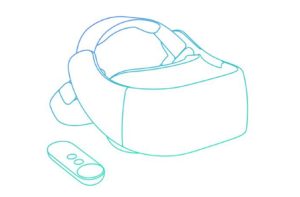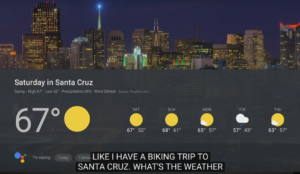M+E Connections

Google Spotlights VR, Machine Learning, Mobile AI at Annual Developers Conference
Story Highlights
At Google’s annual I/O developer conference, held this week near its Mountain View headquarters, the company featured major announcements about products, gadgets and digital applications, highlighting new technologies across all its big platforms. There was plenty of news for the software and hardware developers in attendance, covering major Google platforms like Android, Google Assistant, and Google Home, as well as new information regarding its augmented reality and virtual reality efforts.
The three-day event provided both consumers and developers an in-depth look at Google’s next generation of tech and latest innovations. Here’s a quick look at the key news stories from Google I/O this week:
* Google isn’t building the ultimate VR headset. It’s setting the foundation for one: Google head of VR Clay Bavor describes the new headset as one point on a spectrum called “immersive computing,” an emerging technological paradigm that “enables our computers to work more like we do.”
 His team’s been working on this project for two and a half years, and Google is partnering with Qualcomm, HTC, and Lenovo to release a reference design and two commercial products based on it. If this works, Google’s years-long experiments with augmented and virtual reality will have converged into the ideal self-contained VR headset. But the standalone device feels more like a new beginning than a culmination — and it may be healthier for VR if we treat it that way.
His team’s been working on this project for two and a half years, and Google is partnering with Qualcomm, HTC, and Lenovo to release a reference design and two commercial products based on it. If this works, Google’s years-long experiments with augmented and virtual reality will have converged into the ideal self-contained VR headset. But the standalone device feels more like a new beginning than a culmination — and it may be healthier for VR if we treat it that way.
* Google bringing new UI to Android TV, 360-degree videos, Assistant integration coming later this year: Android TV hasn’t seen too much love in the past few months aside from some new hardware, but Google has some new additions in store as they showed off on stage at I/O 2017.
* Google’s Seurat Aims To Bring ‘Desktop-Level Graphics’ To Mobile VR: Given processing restraints, mobile VR obviously isn’t able to measure up to the kind of visual fidelity we’d expect on PC, but a new development tool from Google is helping to close the gap a little. Google is introducing Seurat, named after French painter Georges Seurat. According to the company this tool can render “high-fidelity scenes” on mobile VR headsets in real time. While Google hasn’t divded too deeply into the specifics, it says the system used tricks to deliver “desktop-level graphics” on mobile.
* Google Home will soon respond on your TV screen with Chromecast: The company announced a new capability that combines its Google Home speaker and its Chromecast TV dongle.
 A TV with Chromecast plugged in will soon be able to display information to supplement Google Home’s voice responses. On stage at Google I/O, the command “OK Google, show me my calendar” caused a calendar to appear on the TV. A follow-up command asking about local weather pulled up a forecast. Google’s voice recognition technology will enable different users’ calendars to be shows according to which voice Google Home detects.
A TV with Chromecast plugged in will soon be able to display information to supplement Google Home’s voice responses. On stage at Google I/O, the command “OK Google, show me my calendar” caused a calendar to appear on the TV. A follow-up command asking about local weather pulled up a forecast. Google’s voice recognition technology will enable different users’ calendars to be shows according to which voice Google Home detects.
* Audio Factory demonstrates Google’s VR spatial audio engine within Daydream: Audio Factory uses Google’s new spatial audio engine. Tied into the VR application, Google’s audio technology properly distributes different noises around the user to make it sound like things are moving all around them.
* Google’s new machine learning framework is going to put more AI on your phone: At the moment, artificial intelligence lives in the cloud, but Google — and other big tech companies — want it work directly on your devices, too. At Google I/O today, the search giant announced a new initiative to help its AI make this leap down to earth: a mobile-optimized version of its machine learning framework named TensorFlowLite.
* Google wants you to use VR more than 40 minutes a week: Google’s Daydream View VR headset has been around for six months, long enough for Google to collect user habits and data about what its VR users are like. At a developer session at Google’s I/O developer conference called “What’s New With Daydream,” some of the stats were revealed. The main takeaways: Google VR users spend more, are looking for more experiences, and don’t spend as much time in their headsets as you probably think.
* Google.ai aims to make state of the art AI advances accessible to everyone: On the stage of Google I/O, CEO Sundar Pichai announced Google.ai, a new initiative to democratize the benefits of the latest in machine learning research. Google.ai will serve as a center of Google’s AI efforts — including research, tools and applied AI. The new site will host research from Google and its Brain Team. It also allows anyone to quickly access fun experiments that highlight the company’s progress in the field.









